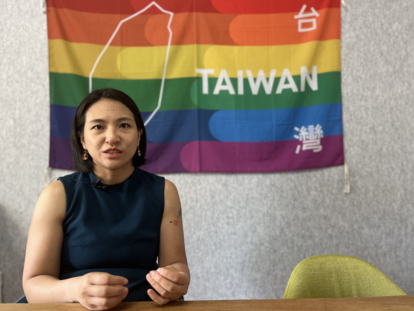Human Rights
Why Taiwan is the Most Progressive Place for LGBTQ Rights in Asia

Nymphia Wind celebrating her win on 'RuPaul’s Drag Race' at Taiwan’s Presidential Office.
© Taiwan Presidential Office CC BY 2.0In 2024, Taiwan marks the fifth anniversary of the legalization of same-sex marriage. Why does Taiwan stand out as the most progressive place for LGBTQ rights in Asia?
An interview by the Friedrich Naumann Foundation Taipei Office with Joyce Teng, the executive director of Taiwan Equality Campaign and a long-time social activist, revealed that Taiwan's progressive gender equity education, robust democratic system, and vibrant civil society are crucial in safeguarding LGBTQ rights.
The Road to Legalising Same-Sex Marriage
Taiwan became the first country in Asia to legalise same-sex marriage. On May 17, 2019, Taiwan's Legislative Yuan passed the special law legalising same-sex marriage, which took effect on May 24 of the same year.
In 2022, Taiwan's Executive Yuan further modified the interpretation of international same-sex marriages, allowing more cross-national same-sex couples to marry in Taiwan, even if their home countries do not recognise same-sex marriage, solidifying Taiwan's position as a pioneer of LGBTQ rights in Asia.
In January 2023, same-sex couples gained the same adoption rights as heterosexual couples. Previously, same-sex couples could only adopt one partner's biological children. The new legislation allows same-sex couples to jointly adopt non-biological children, providing more legal protection and support for families.
Democracy and Civil Society as Vital Strengths
Joyce Teng highlighted Taiwan's democracy and civil society as significant strengths. In other Northeast Asian countries, such as South Korea and Japan, religion and social conservatism remain obstacles.
Ms. Teng mentioned three crucial factors for Taiwan’s success: education, civil society, and the democratic system.
Education
The implementation of the Gender Equity Education Act since 2004 has significantly raised awareness and support for LGBTQ issues among the younger generation. The younger generation has a higher acceptance of diverse genders, with a higher proportion supporting same-sex marriage and LGBTQ rights.
The curriculum includes content on gender equity, such as gender identity and sexual orientation, ensuring students receive accurate gender knowledge in schools.
According to polls from 2018 and 2019, young people under 30 overwhelmingly support same-sex marriage, with support rates reaching 80% to 90% in some age brackets.
Civil Society
Since the lifting of martial law in 1987, Taiwan's civil society has rapidly developed, forming a diverse and active environment for social movements. Civil groups support each other on various issues, promoting social progress.
Moreover, the women's movement and LGBTQ movement in Taiwan have a deep history of cooperation. The women's movement has provided substantial support and experience to LGBTQ groups, especially in legal reforms and social advocacy.
Taiwan's active civil society has abundant resources and experience, effectively organizing activities, conducting public education, and influencing policy-making.
Democratic System
Taiwan's democratic system encourages citizens to actively participate in public affairs, expressing opinions through elections and voting. Voters have significant influence on government policies, which cannot ignore public opinion.
The democratic system has led to implementable political commitments. For instance, during her 2016 campaign, President Tsai Ing-wen promised to support marriage equality, prompting the government to actively push for relevant legislation after being elected, ultimately legalizing same-sex marriage in 2019.
In elections and public discussions, Taiwanese society has the opportunity to pay attention to and understand diverse groups and issues, including LGBTQ rights.

Taiwan Equality Campaign Executive Director Joyce Teng
© Global Innovation HubCurrent Challenges - Assisted Reproduction and Joint Adoption
With increased acceptance of same-sex marriage, Taiwan now faces new challenges in assisted reproduction and joint adoption. These topics remain in the media spotlight.
Currently, Taiwan's Assisted Reproduction Act only applies to heterosexual marriages, requiring couples applying for assisted reproductive technology to be married and have their spouse's consent, meaning lesbian and single women cannot legally use assisted reproductive technology.
The current law defines infertility as "unable to conceive after 12 months of natural intercourse," excluding the situation of "social infertility" faced by single women or same-sex couples.
For example, a lesbian woman wanting to conceive through assisted reproductive technology can freeze her eggs but cannot legally use these eggs for artificial insemination or in vitro fertilization under current regulations because her marriage is not covered by that law.
Single women face the same legal restrictions, unable to use assisted reproductive technology despite their wishes.
Surrogacy is another issue involving the legal relationships among the commissioning parents (couples or individuals wanting a child), the surrogate mother, and the child. The rights and obligations among these three parties need clear regulation to protect everyone's legal rights.
After a child's birth, determining their legal status and dividing legal responsibilities and rights between the surrogate mother and commissioning parents are essential aspects needing detailed regulation.
Amending the law requires adjustments to the existing legal framework, clearly defining legal responsibilities during the surrogacy process, such as the surrogate mother's health protection during pregnancy and the child's custody after birth.
Surrogacy involves numerous social and ethical issues, such as preventing the misuse of commercial surrogacy, protecting surrogate mothers' rights, and preventing exploitation and abuse in the surrogacy process. These issues need thorough consideration and resolution in the law.
Many women's groups have reservations about surrogacy, fearing potential ethical and social issues. Therefore, promoting the legalization of surrogacy requires balancing and listening to different groups' voices.
Advocacy Strategy: Gradual Progress
Since surrogacy law involves more legal relationships and ethical issues, the amendment process will be more complex, requiring further discussion and research to ensure all opinions and interests are fully considered during legislation.
The Taiwanese government's proposed amendment would extend the current scope of the Assisted Reproduction Act, adding same-sex couples, single women, and surrogate mothers to the existing heterosexual infertile couples.
If the amendment passes, Taiwan will become the first country in Asia to legalize surrogate motherhood.
Joyce Teng believes that allowing more identities to use the Assisted Reproduction Act is a positive development, but it is necessary to closely monitor whether the bill ensures everyone's bodily autonomy and that reproductive rights are protected.
Especially for surrogate mothers, who may be economically disadvantaged, it is crucial to carefully observe whether the surrogacy bill could lead to exploitation.
